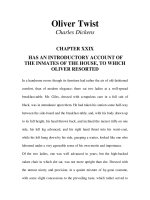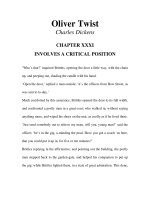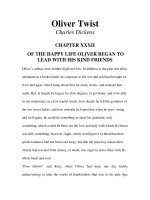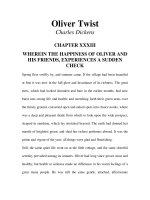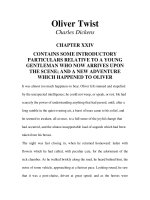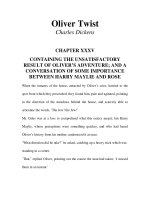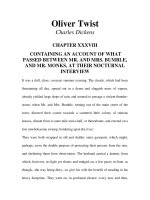Tài liệu LUYỆN ĐỌC TIẾNG ANH QUA TÁC PHẨM VĂN HỌC-THE ADVENTURES OF SHERLOCK HOMES -ARTHUR CONAN DOYLE 9-3 ppt
Bạn đang xem bản rút gọn của tài liệu. Xem và tải ngay bản đầy đủ của tài liệu tại đây (25.79 KB, 10 trang )
THE ADVENTURES OF SHERLOCK HOMES
ARTHUR CONAN DOYLE
The Adventure of the Engineer's Thumb (3)
"This time, at least, I did not scorn her advice. I staggered to my feet and ran
with her along the corridor and down a winding stair. The latter led to
another broad passage, and just as we reached it we heard the sound of
running feet and the shouting of two voices, one answering the other from
the floor on which we were and from the one beneath. My guide stopped and
looked about her like one who is at her wit's end. Then she threw open a
door which led into a bedroom, through the window of which the moon was
shining brightly.
"'It is your only chance,' said she. 'It is high, but it may be that you can jump
it.'
"As she spoke a light sprang into view at the further end of the passage, and
I saw the lean figure of Colonel Lysander Stark rushing forward with a
lantern in one hand and a weapon like a butcher's cleaver in the other. I
rushed across the bedroom, flung open the window, and looked out. How
quiet and sweet and wholesome the garden looked in the moonlight, and it
could not be more than thirty feet down. I clambered out upon the sill, but I
hesitated to jump until I should have heard what passed between my saviour
and the ruffian who pursued me. If she were ill-used, then at any risks I was
determined to go back to her assistance. The thought had hardly flashed
through my mind before he was at the door, pushing his way past her; but
she threw her arms round him and tried to hold him back.
"'Fritz! Fritz!' she cried in English, 'remember your promise after the last
time. You said it should not be again. He will be silent! Oh, he will be
silent!'
"'You are mad, Elise!' he shouted, struggling to break away from her. 'You
will be the ruin of us. He has seen too much. Let me pass, I say!' He dashed
her to one side, and, rushing to the window, cut at me with his heavy
weapon. I had let myself go, and was hanging by the hands to the sill, when
his blow fell. I was conscious of a dull pain, my grip loosened, and I fell into
the garden below.
"I was shaken but not hurt by the fall; so I picked myself up and rushed off
among the bushes as hard as I could run, for I understood that I was far from
being out of danger yet. Suddenly, however, as I ran, a deadly dizziness and
sickness came over me. I glanced down at my hand, which was throbbing
painfully, and then, for the first time, saw that my thumb had been cut off
and that the blood was pouring from my wound. I endeavored to tie my
handkerchief round it, but there came a sudden buzzing in my ears, and next
moment I fell in a dead faint among the rose-bushes.
"How long I remained unconscious I cannot tell. It must have been a very
long time, for the moon had sunk, and a bright morning was breaking when I
came to myself. My clothes were all sodden with dew, and my coat-sleeve
was drenched with blood from my wounded thumb. The smarting of it
recalled in an instant all the particulars of my night's adventure, and I sprang
to my feet with the feeling that I might hardly yet be safe from my pursuers.
But to my astonishment, when I came to look round me, neither house nor
garden were to be seen. I had been lying in an angle of the hedge close by
the highroad, and just a little lower down was a long building, which proved,
upon my approaching it, to be the very station at which I had arrived upon
the previous night. Were it not for the ugly wound upon my hand, all that
had passed during those dreadful hours might have been an evil dream.
"Half dazed, I went into the station and asked about the morning train. There
would be one to Reading in less than an hour. The same porter was on duty,
I found, as had been there when I arrived. I inquired of him whether he had
ever heard of Colonel Lysander Stark. The name was strange to him. Had he
observed a carriage the night before waiting for me? No, he had not. Was
there a police-station anywhere near? There was one about three miles off.
"It was too far for me to go, weak and ill as I was. I determined to wait until
I got back to town before telling my story to the police. It was a little past six
when I arrived, so I went first to have my wound dressed, and then the
doctor was kind enough to bring me along here. I put the case into your
hands and shall do exactly what you advise."
We both sat in silence for some little time after listening to this extraordinary
narrative. Then Sherlock Holmes pulled down from the shelf one of the
ponderous commonplace books in which he placed his cuttings.
"Here is an advertisement which will interest you," said he. "It appeared in
all the papers about a year ago. Listen to this: 'Lost, on the 9th inst., Mr.
Jeremiah Hayling, aged twenty-six, a hydraulic engineer. Left his lodgings at
ten o'clock at night, and has not been heard of since. Was dressed in,' etc.,
etc. Ha! That represents the last time that the colonel needed to have his
machine overhauled, I fancy."
"Good heavens!" cried my patient. "Then that explains what the girl said."
"Undoubtedly. It is quite clear that the colonel was a cool and desperate
man, who was absolutely determined that nothing should stand in the way of
his little game, like those out-and-out pirates who will leave no survivor
from a captured ship. Well, every moment now is precious, so if you feel
equal to it we shall go down to Scotland Yard at once as a preliminary to
starting for Eyford."
Some three hours or so afterwards we were all in the train together, bound
from Reading to the little Berkshire village. There were Sherlock Holmes,
the hydraulic engineer, Inspector Bradstreet, of Scotland Yard, a plain-
clothes man, and myself. Bradstreet had spread an ordnance map of the
county out upon the seat and was busy with his compasses drawing a circle
with Eyford for its centre.
"There you are," said he. "That circle is drawn at a radius of ten miles from
the village. The place we want must be somewhere near that line. You said
ten miles, I think, sir."
"It was an hour's good drive."
"And you think that they brought you back all that way when you were
unconscious?"
"They must have done so. I have a confused memory, too, of having been
lifted and conveyed somewhere."
"What I cannot understand," said I, "is why they should have spared you
when they found you lying fainting in the garden. Perhaps the villain was
softened by the woman's entreaties."
"I hardly think that likely. I never saw a more inexorable face in my life."
"Oh, we shall soon clear up all that," said Bradstreet. "Well, I have drawn
my circle, and I only wish I knew at what point upon it the folk that we are
in search of are to be found."
"I think I could lay my finger on it," said Holmes quietly.
"Really, now!" cried the inspector, "you have formed your opinion! Come,
now, we shall see who agrees with you. I say it is south, for the country is
more deserted there."
"And I say east," said my patient.
"I am for west," remarked the plain-clothes man. "There are several quiet
little villages up there."
"And I am for north," said I, "because there are no hills there, and our friend
says that he did not notice the carriage go up any."
"Come," cried the inspector, laughing; "it's a very pretty diversity of opinion.
We have boxed the compass among us. Who do you give your casting vote
to?"
"You are all wrong."
"But we can't all be."
"Oh, yes, you can. This is my point." He placed his finger in the centre of
the circle. "This is where we shall find them."
"But the twelve-mile drive?" gasped Hatherley.
"Six out and six back. Nothing simpler. You say yourself that the horse was
fresh and glossy when you got in. How could it be that if it had gone twelve
miles over heavy roads?"
"Indeed, it is a likely ruse enough," observed Bradstreet thoughtfully. "Of
course there can be no doubt as to the nature of this gang."
"None at all," said Holmes. "They are coiners on a large scale, and have used
the machine to form the amalgam which has taken the place of silver."
"We have known for some time that a clever gang was at work," said the
inspector. "They have been turning out half-crowns by the thousand. We
even traced them as far as Reading, but could get no farther, for they had
covered their traces in a way that showed that they were very old hands. But
now, thanks to this lucky chance, I think that we have got them right
enough."
But the inspector was mistaken, for those criminals were not destined to fall
into the hands of justice. As we rolled into Eyford Station we saw a gigantic
column of smoke which streamed up from behind a small clump of trees in
the neighborhood and hung like an immense ostrich feather over the
landscape.
"A house on fire?" asked Bradstreet as the train steamed off again on its
way.
"Yes, sir!" said the station-master.
"When did it break out?"
"I hear that it was during the night, sir, but it has got worse, and the whole
place is in a blaze."
"Whose house is it?"
"Dr. Becher's."
"Tell me," broke in the engineer, "is Dr. Becher a German, very thin, with a
long, sharp nose?"
The station-master laughed heartily. "No, sir, Dr. Becher is an Englishman,
and there isn't a man in the parish who has a better-lined waistcoat. But he
has a gentleman staying with him, a patient, as I understand, who is a
foreigner, and he looks as if a little good Berkshire beef would do him no
harm."
The station-master had not finished his speech before we were all hastening
in the direction of the fire. The road topped a low hill, and there was a great
widespread whitewashed building in front of us, spouting fire at every chink
and window, while in the garden in front three fire-engines were vainly
striving to keep the flames under.
"That's it!" cried Hatherley, in intense excitement. "There is the gravel-drive,
and there are the rose-bushes where I lay. That second window is the one
that I jumped from."
"Well, at least," said Holmes, "you have had your revenge upon them. There
can be no question that it was your oil-lamp which, when it was crushed in
the press, set fire to the wooden walls, though no doubt they were too
excited in the chase after you to observe it at the time. Now keep your eyes
open in this crowd for your friends of last night, though I very much fear
that they are a good hundred miles off by now."
And Holmes's fears came to be realized, for from that day to this no word
has ever been heard either of the beautiful woman, the sinister German, or
the morose Englishman. Early that morning a peasant had met a cart
containing several people and some very bulky boxes driving rapidly in the
direction of Reading, but there all traces of the fugitives disappeared, and
even Holmes's ingenuity failed ever to discover the least clew as to their
whereabouts.
The firemen had been much perturbed at the strange arrangements which
they had found within, and still more so by discovering a newly severed
human thumb upon a window-sill of the second floor. About sunset,
however, their efforts were at last successful, and they subdued the flames,
but not before the roof had fallen in, and the whole place been reduced to
such absolute ruin that, save some twisted cylinders and iron piping, not a
trace remained of the machinery which had cost our unfortunate
acquaintance so dearly. Large masses of nickel and of tin were discovered
stored in an out-house, but no coins were to be found, which may have
explained the presence of those bulky boxes which have been already
referred to.
How our hydraulic engineer had been conveyed from the garden to the spot
where he recovered his senses might have remained forever a mystery were
it not for the soft mould, which told us a very plain tale. He had evidently
been carried down by two persons, one of whom had remarkably small feet
and the other unusually large ones. On the whole, it was most probable that
the silent Englishman, being less bold or less murderous than his companion,
had assisted the woman to bear the unconscious man out of the way of
danger.
"Well," said our engineer ruefully as we took our seats to return once more
to London, "it has been a pretty business for me! I have lost my thumb and I
have lost a fifty-guinea fee, and what have I gained?"
"Experience," said Holmes, laughing. "Indirectly it may be of value, you
know; you have only to put it into words to gain the reputation of being
excellent company for the remainder of your existence."

